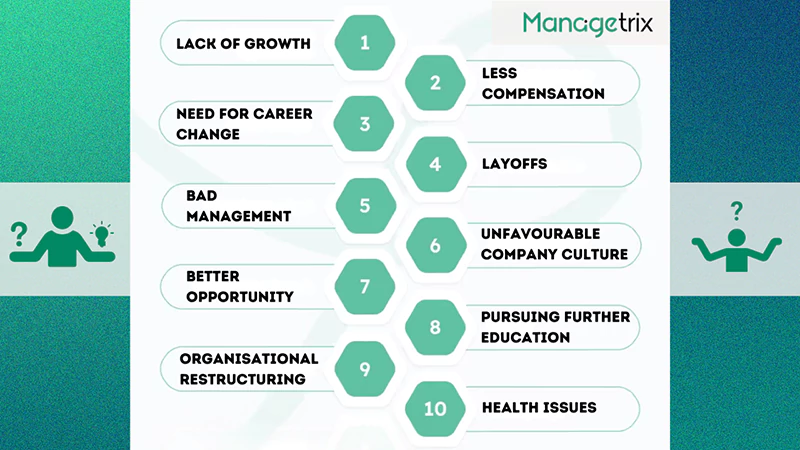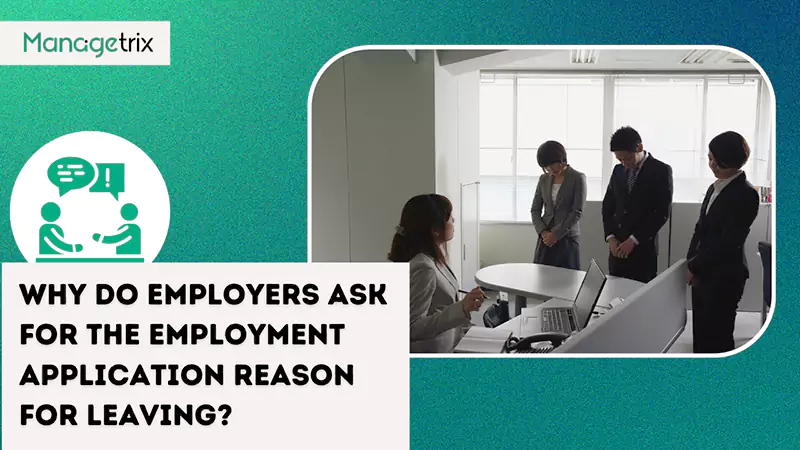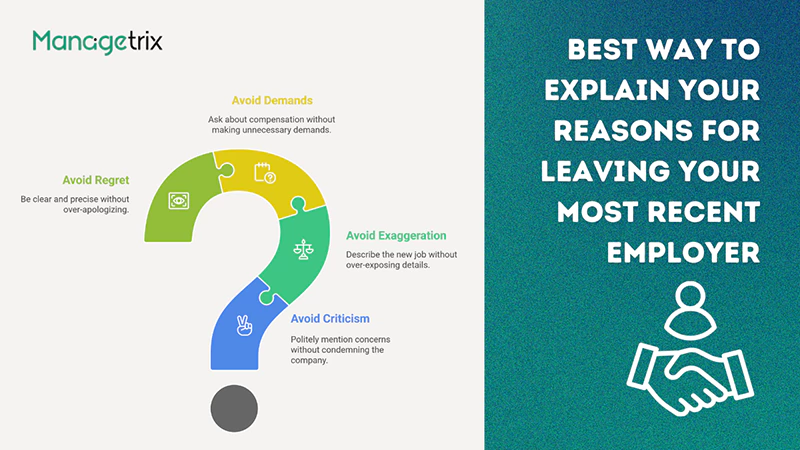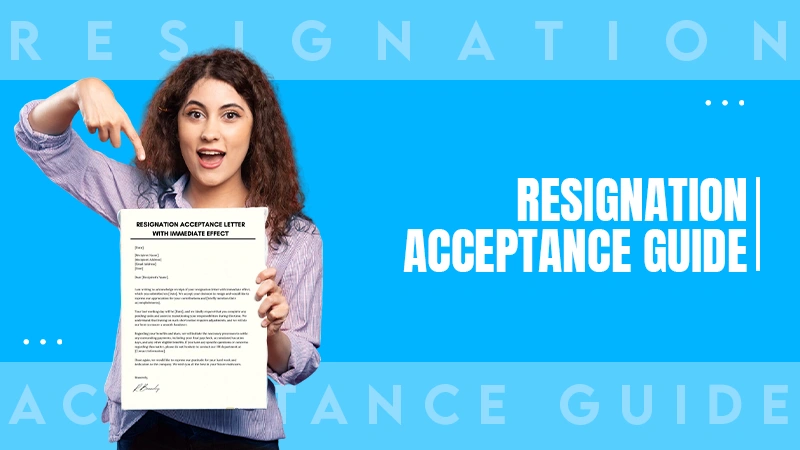Are you planning to quit your job? If yes, never underestimate the employment reason for leaving! It is the most crucial aspect of every type of job interview. You will have to learn about all the major reasons why people leave a company! Learning about them will equip you with multiple options to choose from while answering an interviewer about why you resigned from the previous organisation in the first place.
In the article below, we will discuss 10 reasons for quitting current employment. And, get to know why employers ask this particular question. So, for the ultimate preparation for your upcoming job interview, go through this exclusive read till the end.
What are the 10 Employment Reasons for Leaving? Better Prepare for Future Interviews

Professionally explaining your employment reason for leaving the last company is key to successfully getting hired in a new one. All it takes is to answer the question of why you left the last company as clearly and honestly as possible. Employees quit their jobs for a variety of reasons, such as:
- Lack of Growth
- Less Compensation
- Need for Career Change
- Layoffs
- Bad Management
- Unfavourable Company Culture
- Better Opportunities
- Pursuing Further Education
- Organisational Restructuring
- Major Health Issues
Each of these reasons is discussed below in detail.
Lack of Growth
When there is no opportunity or means of long-term growth or professional advancement, the workplace begins to give off the feeling of stagnation. There is not enough motivation for workers to wake up and feel the urge to go to work. No one would like to work in a place where growth isn’t provided, despite someone’s best efforts.
Workers or employers feel disheartened under such circumstances, ultimately having to deal with traumatising self-pressure to resign. If this is your reason for leaving the previous employer, don’t worry, as a lack of growth is a legitimate cause.
Less Compensation
Many employees don’t realise for long that they are getting underpaid while working for particular companies. Thus, when they realise it from their colleagues or otherwise, it causes mental anguish and discomfort. As a result, the affected worker either wants to get their remuneration increased or quit the position.
Before quitting, continuously try to secure a job somewhere else where you get what you need, want and ultimately deserve! Once you have landed a well-paid employment opportunity, leave the current company on good terms, following the company’s rules and regulations at the time of resignation.
Also Read: How to Write a Leave Letter for Work? Here is the Format with 10 Unique Samples
Need for Career Change
Not everyone plans their career in advance, and then everything unfolds in the desired ways. Once a career has unexpectedly happened, some people continue to be in the same profession for their lives, while others make an effort to change it into what they truly want to do or find fulfilment doing!
For example, a student who couldn’t find a job as a teacher after completing all the required educational qualifications might have to work as a salesperson in a company due to financial needs. However, if ever there is an opportunity in the desired field as a teacher, the same person without a doubt will immediately switch careers for personal satisfaction, fulfilment, and better utilisation of academic qualifications.
Layoffs
Sometimes, leaving a previous job is not voluntary but an act of termination from the side of the employer, a layoff! The most recent example of the same is massive layoffs in the tech industry due to the technological advancement of Artificial Intelligence. Going even further back in time, the COVID-19 pandemic was also the time when many people as employees lost their jobs.
Thus, if due to some common and uncontrollable reason, a previous company decided to lay you off, there is nothing to worry about. You can state the reason for leaving your employment as it is (your layoff due to the pandemic or anything).
Bad Management (Toxic Work Environment)
Another one is where people quit their jobs not because of being dissatisfied with their career option or work, but rather due to the controlling administrative staff. Workplace stress is often very complicated to explain to another boss or a senior who might be conducting the interview, as it is a subjective experience.
So, when you left a job due to incompatibility with seniors or co-workers, it is best to say that you had to resign from your previous employment due to the following reason: The work culture didn’t align with what I was seeking for professional development. Afterwards, never forget to add why you consider the current employment the right fit.
Unfavourable Company Culture
Every company’s work culture is defined by the nature of its policies and the behaviour of workers and administrative staff! So, if an employee doesn’t find these two things (work culture) suitable for their personal and professional growth, they might want to switch to another company.
Furthermore, sometimes, an age or generation gap can also be an issue, as it also affects the work culture. Such an employer might want to work in an active, dynamic, and highly collaborative work environment, typically where the same-age employees outnumber the older ones.
So, if that is your reason to quit the last job, communicate the same with the current interviewer and state clearly how their company is the right fit for you.
Blessed with a Better Opportunity
If there is a career opportunity that promises a higher salary, better facilities, perks, etc., it is a must to grab it. No one can deny that in such a situation, quitting the current job is acceptable and agreeable. Thus, if that is the reason to leave the last employer, there is nothing to worry about.
You can just state the reason as it is, here as well. Many people switch jobs when blessed with better chances. This is how we make progress in life, rather than being stuck in the same place with stagnancy forever. However, it is recommended that you always leave one company on good terms before planning to join another one.
Pursuing Further Education
Many people also quit their current jobs so that they can start pursuing education once again or complete a professional course for upskilling or career advancement. In that case, when such a person again enters the workforce, an interviewer might want to learn about the nature of the education that they pursued.
Just explain how a particular course has enriched your professional life. The right candidate will always find work, no matter what the circumstances were in the past!
Organisational Restructuring
Employment reason for leaving can also be attributed to organisational restructuring. If your position and roles have been altered illogically after a major change in the internal structure of your company, quitting is considered legitimate.
For example, suppose you work under the marketing department. But the company decides to outsource marketing services from an external agency to save costs and limited resources. Hence, now, you are adjusted in the sales team.
In that case, you might want to quit the job and start looking somewhere else where your skills can be best utilised! So, this is a genuine reason to quit the last employment. When facing an interviewer, the same can be explained completely, as it is.
Health Issues
Sometimes, due to major health complications, a person has to quit their job! In that case, after recovery, if you are looking for another job, there is nothing to worry about.
The interviewer will understand your reason. However, to make it authentic, you can have your medical discharge paper on your smartphone to show and back up your reason in case asked.
So, all these reasons are possible that might cause someone to leave their current job and start looking for another job opportunity. If you have recently quit a job, consider the following sections to prepare for future interviews.
Also Read: How to Become an HR Manager in a Company? (2025)
Why do Employers Ask for the Employment Application Reason for Leaving?

Asking for the employment reason for leaving a previous company helps an interviewer evaluate several things, ultimately deciding on the right candidate. It helps save time, money, and resources for both a potential hire and the company. Hence, the 5 simple reasons why employers ask this question are listed below.
- Professionalism: Every employer wants to see how professional you are when it comes to communicating experiences from the previous company, even though there were major challenges.
- Background Check: Many new hires at the time of the interview often make up a false reason for leaving their previous employer. Thus, HR (human resources) and other key decision makers want to make sure that there aren’t any major issues with the competence and behaviour of the candidate at hand. They also analyse whether the reason for leaving employment sounds genuine!
- Career Goals: If a candidate has left their last employer for upskilling and career growth, learning about the same is crucial for the interviewer. It helps them see how fit an available opportunity is going to be for the person they are entertaining.
- Cultural Fit: Sometimes, new hires leave the company right after a few weeks or months after joining. The major reason for the same is that they couldn’t fit into the culture of the company. Hence, learning about the employment reason for leaving also helps see if the person might have issues with the new company’s prevailing culture and work ethics.
Furthermore, learning about the same also helps the interviewers find out what it is that you are seeking or what motivates you right now in your professional field.
Also Read: What Is an Appointment Letter? Everything You Need to Know
What is the Best Way to Explain Your Reasons for Leaving Your Most Recent Employer?

While explaining your reason for leaving employment, make sure that you are transparent, positive, conscious, professional, and futuristic! Consider all these reasons in detail below.
- Converse Transparently: It is always recommended to speak out the true reason why you left while giving an interview for a new job. Be as transparent as possible.
- Stick to a Positive Mindset: Keep a positive mindset. Don’t hesitate or suffer from low confidence. Appear for the interview with a smile, and never forget to discuss why this job is the best opportunity for you.
- Be Conscious: Be extremely mindful of what you are saying. Prepare in advance for all potential aspects of the why-you-left-previous-company question. Keep your answers short so that they are easy to process and understand.
- Professionally State Quitting Reasons: Show the interviewer that you have left the previous company professionally, having completed all the formalities well. It will help create a positive image.
- Focus on the Future: While attending an interview, don’t talk a lot about what you didn’t like about the last company and the seniors you worked under there. Now, try to focus more on how good you see the current job opportunity.
If you still feel unsure about how to appear for an interview for a new job opportunity, connect with a career coach or professional assistant provider. A professionally trained coach will help you prepare for a job attempt in the best way possible.
Also Read: Difference Between HRM and HRD: Holistic Comparison and Analysis
Conclusion
The reason for leaving the last company is asked by the interviewer of the interviewee, to learn about their professionalism and work ethic in past companies. Thus, a candidate must always answer genuinely, never fabricating stories or lies to make an impression. Always be sincere and true to the actual experiences.
Before leaving a company, ensure that you have salary slips for the previous three months, along with a work experience letter. Additionally, you must also have your relieving letter in your hand before you completely take your departure. In case you need professional help to prepare for an interview, connect with a career coach for practical guidance.
FAQs
1. Is it hard to find a new job after quitting one?
Ans: No, it is not hard if you are competent, have enough experience and expertise in your field. It might take a while, but you will definitely find good opportunities with your best efforts put forth in due course of time.
2. How to find a new job quickly?
Ans: Get your resume ready. Prepare for the question about why you resigned or quit the last company well in advance. Ask for help from a career coach if required. And, be positive and never get attached to any opportunity. Just do your best and leave the rest.
3. How to deal with a toxic senior without resigning from the current employment?
Ans: Try to behave as much as possible in the same way as desired by toxic seniors at work. Or, as far as toxic juniors are concerned, avoid them as far as possible. Moreover, never share your personal life with anyone at work when not necessary.




